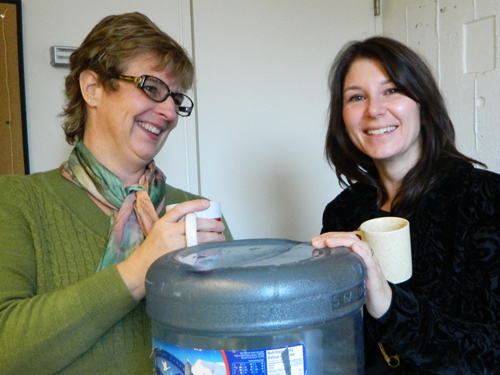
Think we’re the only ones who gossip? Apparently not. Bottleneck dolphins have been observed discussing other members of their pods who happen to be absent.
And while these days we often think of gossiping on social network sites and by text messages, people have been talking about others behind their backs throughout history.
You can learn more about the ramifications and role of gossip at the “Gossip…so much more than hearsay” conference, organized by Profs. Dawn Cornelio and Stéphanie Nutting, both from the School of Languages and Literatures. They are working with a planning committee that includes Prof. Don Dedrick of the philosophy and psychology departments along with French studies undergraduate student Jessica Martin and European studies master’s student Jamie Jackson.
Scheduled for May 10 to 12, the event will feature keynote speakers Prof. Vincent Janik, from Scotland, who has studied gossip among dolphins, and Prof. Nathalie Solomon, from France, who will be discussing “Gossip as a Creative Device.” Between 25 and 30 other papers will be presented as well, exploring gossip from many perspectives. Dedrick, for example, will discuss gossip as a by-product of evolutionary pressures.
Cornelio and Nutting became interested in this topic after hearing Solomon speak at an earlier event. Says Nutting: “Her talk was limited to gossip in literature but we thought that there were many other fields where gossip hasn’t been explored. It’s a big topic. We think of gossip as being trivial but in fact it is very powerful.”
Coming up with a precise definition of gossip wasn’t easy, and the organizers have deliberately picked one that was broadly inclusive. “We define it as communication about an absent individual,” says Cornelio. “It’s not just being nasty about someone; it’s much more complex than that. It can be positive or negative.”
“And it’s been around forever,” Nutting adds. “There is a taboo about gossip, but I don’t think you can get rid of it. In fact, that’s one of the issues to be discussed at the conference – questions of propaganda and censorship.”
Finding speakers for the event was a bit tougher than they’d expected at first. “Nobody has a PhD in gossip,” points out Nutting. “This is a novel topic for a conference, and while everyone is fascinated by the topic, it does push people out of their comfort zone to actually examine it.”
Yet understanding the uses and powers of gossip adds new perspectives to many fields. Cornelio points out how countries use gossip to shame and manipulate each other. For example, the U.S. did this to countries that were unwilling to participate in the coalition president George W. Bush created.
During the time of the Roman Empire, news and information spread more quickly through gossip and informal back channels than it could through the official routes.
“Gossip is often seen as something women do,” says Nutting. “That’s inaccurate, but women are especially vulnerable to gossip,” she says. “For women, the public and private spheres of their lives are not as separate as they appear to be for men.”
Speakers who will highlight this point are Jamie Jackson, Melissa Skinner-LaPorte and Matthew Toth, all graduate students who have been working with music professor Kimberly Francis. They will discuss the gossipy side of the letters between composer and music teacher Nadia Boulanger and Théodore Strawinsky, son of the famed composer Igor Stravinsky (his son chose the Russian spelling of the family name).
Will this conference be the first of many on gossip? Cornelio says they’ve been so busy organizing this one that they haven’t actually made a plan for the future, but she’d like to see conferences on this topic offered in other parts of the world. “We have established a recent partnership with the Crossroads in Cultural Narratives organization, involving nine European universities plus the U of G,” she adds, explaining that her hope is that one of the European universities in the group might take on the conference next.
Arrangements have already been made to publish some of the papers presented through Synergies, an electronic journal based at U of G.
Students will be able to attend the conference at no charge; a small fee will be required of the general public to cover some of the costs. “This will be an exciting event with lots of opportunity for interaction, sharing and developing ideas, and it’s small enough that everyone will be able to hear all the papers,” says Nutting.